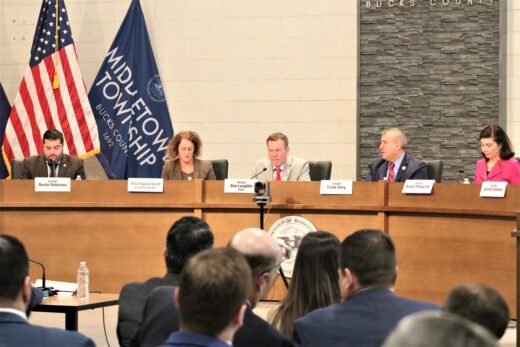
Tax and municipal officials told a panel of Republican state senators in Bucks County on Thursday that a Great Depression-era state law deprives local towns of millions of dollars.
The Pennsylvania Senate Republican Majority Policy Committee, which includes Langhorne Borough-based State Sen. Frank Farry, heard testimony on how the Sterling Act of 1932 allows Philadelphia special taxing privileges that takes money away from suburban communities.
The Sterling Act of 1932 is a Great Depression-era state law that grants Philadelphia the special authority to levy income taxes at the resident and source level. The law allows for the city’s wage tax that residents of Philadelphia pay and non-residents who work for companies based in the city also are required to pay. As of the 2022 tax year, the city wage tax is 3.79 percent for residents and 3.44 percent for commuters, both lower rates than in past years.
Under the Sterling Act and backed up by related case law, Bucks Countians who work in the city or for a company based there aren’t required to pay an earned income tax (EIT) in their home municipality if it has one. Outside of Philadelphia, residents have to pay an EIT to the town they live if their municipality has one. EITs are .5 or 1 percent and help towns pay for core municipal services and can also be used to help fund school systems.
While suburban towns have always griped about the Sterling Act and the special authority it grants Philadelphia, the pandemic has renewed the towns’ upsetment as more of their citizens were working from home, using local roads, and utilizing municipal services while sending their wage tax money to the city.
It is estimated that Bucks County municipalities lose close to $10 million in EIT revenue to the city and school districts loose millions more, according to data from Keystone Collection Group, which is a contractor many towns use to collect taxes.
Combined, Newtown Borough, Newtown Township, Upper Makefield Township, and Wrightstown Township lose more than $667,000 in potential tax revenue to the city annually. The Council Rock School District loses more than a $1 million each year.
The Bucks County Association of Township Officials has data showing at least 20,377 people from nearly every town in the county pay a city wage tax.
Click here to read all the testimony from the hearing.
Bensalem Township Mayor Joseph DiGirolamo testified his municipality, which could gain $2.5 million in tax revenue yearly, already is impacted more than other towns because it borders the city. Revenue from residents who work for city employers but live in the township would help fund road work and policing, which he said largely deals with issues that stem from Philadelphia.
“The inherent unfairness of this arrangement is exacerbated by the fact that this lost and unrealized revenue ultimately has to be made up either by Bensalem wage earners who do not work in Philadelphia or by residential property owners regardless of their employment and retirement status,” he said.

Credit: Tom Sofield/NewtownPANow.com
The mayor added: “We certainly recognize the importance of Philadelphia to the economy of our region and the commonwealth. However, Bensalem’s proximity to the city on its northeastern border also results in great economic challenges to our community, particularly in the area of law enforcement, crime prevention and infrastructure.”
DiGirolamo told he GOP state senators that he supports a change in law that allows municipalities with EITs to collect their 1 percent of the wage tax and remit the other 2-plus percent to the city. He said the change could be implemented over five years to ease the burden on the city.
“We’re not asking for anything that’s unfair,” he said.
“Our people are suffering,” the mayor added.
“Eliminating the Sterling Act requirements will provide much needed financial relief to municipalities struggling with caps on real estate millage levies imposed by state law,” said Northampton Township Manager Robert Pellegrino, who also chairs the Bucks County Tax Collection Committee. “Doing so will help fund increased cost of providing essential local government services for the protection of public health, safety, and welfare.”
Pellegrino said he understands why the Sterling Act was established during the Great Depression. He noted that most suburban communities offered limited services and could cover their costs with real estate taxes at the time, but modern municipalities offer more services, including parks, police, fire, ambulance, senior, stormwater management, and extensive transportation services. He added new regulations cost millions more per year.
With more and more people working from home, former Republican State Rep. Wendi Thomas, of Northampton Township, talked to the committee of the unfairness of people having to pay their wage tax to the city when they’re working from their suburban homes.
Thomas cited two examples of residents in her former legislative district who were eligible for refunds on some of their city wage taxes, but had to fight the city to get them. One never did get their refund.
Joseph Lazzaro, a senior vice president for Keystone Collections Group, testified that the tens of millions collected from suburban residents by the city has never been exactly calculated.
“We actually know that the losses to Bensalem and Northampton and to all of the communities in Bucks County, Delaware County, Chester County, and Northampton County are in reality greater than we can show you in these reports,” he said.
Matthew Melinson, a tax partner at accounting firm Grant Thornton, said changes to the law will require legislators to consider several issues, including whether the city should keep any of the wage tax revenue and impacts on taxpayers who work in Philadelphia less than 100 percent of the time.
The Sterling Act has been fought by suburban towns and some taxpayers for decades, but the 90-year-old law has prevailed every time.
Joseph Pizzo, the solicitor for Bensalem and Northampton townships, advocated for legislative change.
“As times have changed, as the city has changed, as the southeast region has changed, and as the needs and costs to deliver governmental services has changed during the almost century since the Sterling Act was first adopted, now, more than ever, is the time for the legislature to consider and adopt changes to the Sterling Act so as to alleviate, if not eliminate, its negative impacts on the suburban communities surrounding the City of Philadelphia,” Pizzo told lawmakers.
Rob Dubow, the Philadelphia finance director, submitted written testimony to the committee.
Dubow said the city would lose $190 million in wage tax revenue if home municipalities received 1 percent of that tax.
“If the city were to impose tax increases in an attempt to compensate for the lost revenue, those increases would likely drive away jobs and businesses that help generate economic activity for the entire region,” he said. “Whether the city had to make these potential cuts or tax increases in one year or in five years if the credits were phased in, the impact would be equally devastating. In either case, the city would need to take dramatic action just to avoid crippling deficits.”
Officials from Middletown Township, Warminster Township, Wrightstown Township, and other suburban communities were in the audience for the hearing. GOP State Representatives Joe Hogan, of Middletown Township; K.C. Tomlinson, of Bensalem Township; and Kristin Marcell, of Wrightstown Township, were also at the hearing.
Stacey Mulholland, the executive director of the Bucks County Association of Township Officials and the manager in Wrightstown Township, said following the hearing: “Due to an antiquated piece of legislation known as the Sterling Act of 1932, Bucks residents working in Philly have no choice but to leave behind nearly $9 million in annual municipal earned income. While they may return home daily from their commute to Philly, their tax dollars don’t. Unlike the commonwealth and Philadelphia, municipalities have limited ways in which to fund their government. Local tax dollars support very basic government services such as roads and public safety. The Sterling Act as it is, desperately needs to be amended. It’s time has passed.”
Farry, the state senator from the Sixth Senatorial District that stretches from the lower to central part of the county, has supported changes to the Sterling Act that allows local municipalities to obtain some of the tax revenue.
After the hearing, Farry said he was impressed with the traction the hearing had and he hopes to push for change.
State Sen. Dan Laughlin, of the City of Erie, is the chairman of the committee. He said he was just learning of the Sterling Act, but would support efforts to change it.
Laughlin told NewtownPANow.com he believes the GOP-controlled senate would support change, but he feared the Democrat-majority in the Pennsylvania House would not support the change, citing many in their caucus represent Philadelphia.











